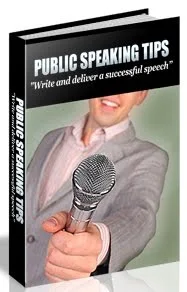Before I went into professional speaking, I read lots of books and attended countless seminars on persuasive speaking tips.
Here are 14 persuasive speaking tips, which can help you to overcome your speech anxiety, so you can speak more confidently in your next speech or presentation.
1. A Well Researched Materials
Of all the persuasive speaking tips, this one is crucial.
The content of your speech is the essence of your presentation or speech.
It must be thoroughly researched. Ensure your content is correct and up-to-date.
2. Know Your Audience
In order to plan out your material, you need to know exactly who your audience is.
And what is the objective of your talk or presentation.
2. Convey Clearly
Make sure the message of your speech is focused and can be easily understood by your audience.
3. Well Organized Ideas
Plan and write out your ideas on the paper.
Then sort it out and organize them in order of importance.
Remove those ideas which you think are not necessary.
Remember all the points are linked coherently; so your audience can follow you.
4. Relevant Supporting Stuff
Make sure they are definitely relevant to your materials.
It can be a profound quote, fascinating fact, or startling statistics.
Use them to enhance your message.
5. Metaphors And Analogies
Make use of suitable metaphors and analogies to illustrate your speech clearer and more effective.
6. Storytelling
Master your story telling skill.
It is a good way to make your speech engaging. People love and remember a good story. It could be your own personal experience or from other sources.
7. Open And Close With Impact
This is another vital persuasive speaking tips.
The speech introduction or opening and the speech conclusion.
Personally I encourage you to take time and write out word for word for the opening and closing.
They are not meant to be read out to your audience. It is for you to practice in the privacy of your home or office. They should be impact and memorable.
8. Jazz It Up With Humor
Again, just like the use of supporting materials, the humor has to be appropriate and relevant to your topic. laughter builds rapport and helps to reduce your speech anxiety.
9. Modulate Your Voice
Your voice is going to be the star of the show.
Make sure it helps you to convey your message effectively.
Watch your pronunciation inflection, tone, pitch and clarity. And not forgetting the pacing and the pauses too.
10. Gestures And Facial Expressions
Body language can help you to convey your message.
For instance, you can use exaggerated hand gestures or facial expressions to stress your point. Remember not to overdo.
11. Visual Aids
The visual aids are meant to support and enhance your presentation or talk, and not causing distractions. Use minimum visual aids and concentrate on your verbal communication skills.
12. Connect With Your Audience
Maintain eye contact with your audience, as if you are having a friendly conversation with them.
Smile an nod your head every now and then.
13. Time Limit
Know your time limit.
Make sure you end your speech as the time allocated.
Most of time, people do not mind a shorter speech, but definitely not an overrun talk.
14. Unforeseen Incidents
You need to prepare for the unexpected.
Always standby with an extra set of visual aids and the AV(audio-visual) equipment.
Prepared yourself with some self-effacing humor (making fun of yourself), to be used if there is any technical hitch or your own boo-boos.
